

Magazines. 'Scrapers' Dig Deep for Data on the Web. Librarians: Masters of the info universe. CNN librarian Kerith Page McFadden works at her desk in Washington.
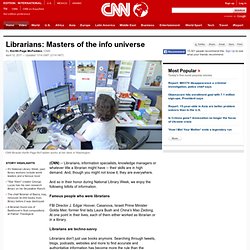
It's National Library Week; past library workers include world leaders and a famous lover"Star Wars" creator George Lucas has his own research library on his Skywalker Ranch.The chief librarian of Basra, Iraq, removed 30,000 books from library before it was destroyedA librarian found one of Beethoven's final compositions at Palmer Theological (CNN) -- Librarians, information specialists, knowledge managers or whatever title a librarian might have -- their skills are in high demand. And, though you might not know it, they are everywhere. And so in their honor during National Library Week, we enjoy the following tidbits of information. When Not to Google: Searches You're Better Off Making Elsewhere. The trouble with Google Books - Laura Miller. Depending on who you ask, Google Books — the pioneering tech company’s ambitious plan to “digitally scan every book in the world” and make them searchable over the Web and in libraries — is either a marvelous, utopian scheme or an unprecedented copyright power-grab.
The people who can claim to fully understand the Google Books Search Settlement — the resolution of a class-action suit filed against the company by the Authors Guild and the Association of American Publishers — may be as few as those who comprehend the theory of special relativity. But everyone seems to agree that Google Book Search represents a revolutionary boon to scholars, especially people embarked on specialized research but without ready access to a university library. But is it?
Nunberg, a linguist interested in how word usage changes over time, noticed “endemic” errors in Google Books, especially when it comes to publication dates. Google's Book Search: A Disaster for Scholars - The Chronicle Review. By Geoffrey Nunberg Whether the Google books settlement passes muster with the U.S.
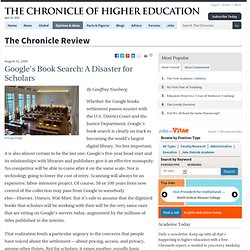
District Court and the Justice Department, Google's book search is clearly on track to becoming the world's largest digital library. How Can Libraries Use the Cloud? Tame The Web. I’ve been using Apple’s .mac service for years, since 2001 as a matter of fact.
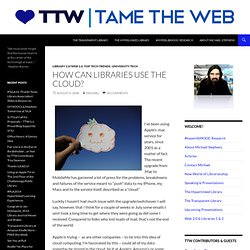
How Government Data Can Improve Lives - Economic View. Take data that you and I have already paid a government agency to collect, and post it online in a way that computer programmers can easily use.
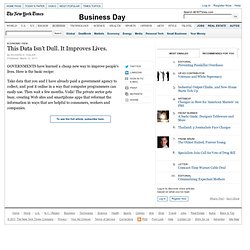
Then wait a few months. Voilà! The private sector gets busy, creating Web sites and smartphone apps that reformat the information in ways that are helpful to consumers, workers and companies. Not surprisingly, San Francisco, with its proximity to Silicon Valley, has been a pioneer in these efforts. For some years, Bay Area transit systems had been tracking the locations of their trains and buses via onboard GPS. Digital Age is Slow to Arrive in Rural America. As the world embraces its digital age — two billion people now use the Internet regularly — the line delineating two Americas has become more broadly drawn.
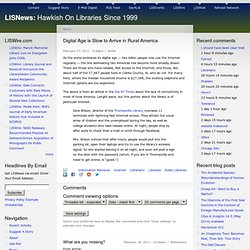
There are those who have reliable, fast access to the Internet, and those, like about half of the 27,867 people here in Clarke County, AL who do not. For many here, where the median household income is $27,388, the existing cellphone and Internet options are too expensive. Bulletin December 2008/January 2009. Bulletin, December 2008/January 2009 Explaining Free and Open Source Software by Scot Colford.

File Not Found: The Record Industry's Digital Storage Crisis. News, Press Releases and Reports - Working Group on the Future of Bibliographic Control. State of the indy music industry looks rosy, so why all the doom-and-gloom about music? TuneCore's Jeff Price has a six-part series analyzing the financial state of the music industry from the point of view of an independent artist.
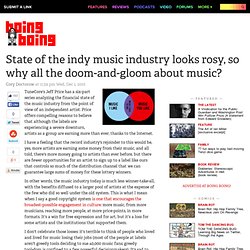
Price offers compelling reasons to believe that although the labels are experiencing a severe downturn, artists as a group are earning more than ever, thanks to the Internet. 39;s Blog: The Half-Life of Digital Formats. I've argued for some time that there are no longer any plausible scenarios by which a format will ever go obsolete if it has been in wide use since the advent of the Web in 1995.
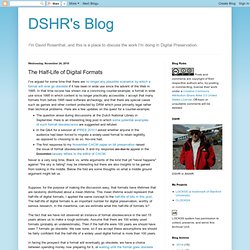
In that time no-one has shown me a convincing counter-example; a format in wide use since 1995 in which content is no longer practically accessible. I accept that many formats from before 1995 need software archeology, and that there are special cases such as games and other content protected by DRM which pose primarily legal rather than technical problems. What I want LIS students to know. Every fall, a new group of graduate students arrives in the classroom on their way to becoming librarians and information professionals.Each group is full of energy and ideas, and ready to take on the world.
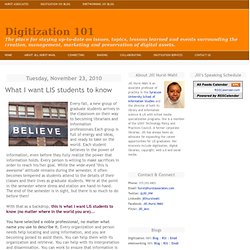
Each student believes in the power of information, even before they fully realize the power that information holds. Every person is willing to make sacrifices in order to reach his/her goal. A renaissance rooted in technology: the literary magazine returns. When was the last time you looked out of the window when sitting on a bus?
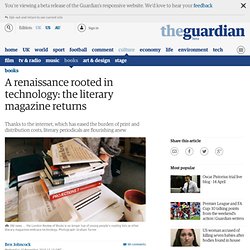
With the internet now in the palm of our hands, it's so much a part of our daily lives that it permeates our every spare second, taking up the time and energy that we once used to read books. If the novel is struggling in this new environment, what of literary magazines? Long extinct? The opposite: literary magazines are getting popular again. Free internet: The librarian's tale. Steve Jobs and "the bicycle for the mind" I enjoyed this extensive interview with John Sculley about his time at Apple (he was CEO from 83-93) because of 1) his insight into Steve Jobs' way of thinking, 2) his willingness to talk about his mistakes, and 3) his insights about business in general...he gives Jobs a lot of credit but Sculley is clearly no slouch.
Some high points: [Jobs] felt that the computer was going to change the world and it was going to become what he called "the bicycle for the mind. " On the small size of teams actually building products: Normally you will only see a handful of software engineers who are building an operating system. Blog Archive Copyright is killing sound archiving and fair use isnt doing so well either. 10 Online Slang Dictionaries To Learn Jargon & Street Language. That’s the story with a lot of street-speak and jargon. Slang words don’t mind that they are not a part of Webster’s or Roget’s.
It is just a matter of time before they get hauled up from the streets and into the pages of a regular dictionary. US Library of Congress: Copyright Is Destroying Historic Audio. You think only "pirates" and "freeloaders" rail against current copyright laws? Well, think again - even the Library of Congress seemingly has had enough. The topic is recorded sound preservation, and in a 181-page in-depth study, the Library of Congress concludes that apart from technical difficulties, US copyright law makes it virtually impossible for anyone to perform any form of audio preservation. Mental_floss Blog Digital Records Are Fading Fast.
I'm a collector of vintage snapshots. (Here are some I've collected, from another post.) Besides the thrill of finding something beautiful and historically significant in a bin of unsorted Polaroids, there's also the knowledge that you're rescuing images from oblivion -- the trash. Vintage snapshots and postcards are often referred to by the catch-all "ephemera," but the real ephemeral stuff, in my opinion, are digital photographs -- and digital films and digital audio recordings.
Digital files are corruptible. Technologies change fast. New digital recordings of events in U.S. history and early radio shows are at risk of being lost much faster than older ones on tape and many are already gone, according to a study on sound released Wednesday. University Assigns Freshmen "Personal Librarians" Academia tests crowd-sourcing. Opens nation's first bookless library on a university campus. By Christi Fish Public Affairs Specialist (Sept. 9, 2010)--UTSA officials announced Thursday the opening of the Applied Engineering and Technology (AET) Library, the nation's first completely bookless library on a college or university campus.
Applying "ownership" to links, public domain material does more harm than good. Code of Ethics. Common as Air: Revolution, Art, and Ownership. Technology Review: The Death of Libraries? At most libraries, the hand-typed card catalogues thumbed by generations of patrons have been supplanted by electronic indexes accessed via PCs locally or over the Web. Now that Google has agreed to scan millions of books from five major libraries and to make their contents searchable on the Web – a project that experts say is likely to yield spinoff technologies that drastically lower the costs of digitization and catalyze similar efforts worldwide – can the disappearance of libraries themselves be far behind?
Most librarians say no, as our story “The Infinite Library,” reports. Whatever the form in which book content is stored, librarians believe, people will still come to libraries for expert help finding information, for public access to the Internet, or for the comfortable atmosphere libraries provide for reading and reflection. The Medium - What Fact-Checking Means Online. A Library Primer by John Cotton Dana. Is Information a Commodity? More People Getting DVDs From Library Than From Netflix Or Redbox. Top 7 Semantic Search Engines As An Alternative To Google. There’s no denying the power and popularity of the Google search engine, and in comparison to other similar search engines such as Bing, where results are based on page rankings and algorithms, they excel.
But there are other ways to search the web, using what are known as semantic search engines. Using a semantic search engine will ensure more relevant results based on the ability to understand the definition of the word or term that is being searched for, rather than on numbers. Semantic search engines are able to understand the context in which the words are being used, resulting in smart, relevant results. Repositories Support Project. Everything you need to know about the internet. Home - American Library Association.
Gallery: Digitizing the past and present at the Library of Congress. The Library of Congress has nearly 150 million items in its collection, including at least 21 million books, 5 million maps, 12.5 million photos and 100,000 posters. The Coming Data Explosion. Marian the Cybrarian - Advice. By Thomas H.